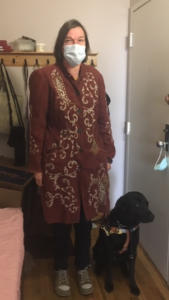Service Dogs in the Pandemic, Part Two: Fear Not, Dogs Do Not Spread COVID19
by Beth
 I live in Chicago, one of the cities where businesses and other public places are starting to re-open.
I live in Chicago, one of the cities where businesses and other public places are starting to re-open.
I also use a service dog.
The re-opening of public places comes with many new regulations and rules about wearing masks, staying six feet apart, temperature testing and occupancy guidelines. One thing those of us with disabilities need to remember is that with all the changes resulting from the coronavirus, one thing that stays the same is this: The law still gives us the right to have equal access to public places, transportation, and air travel.
And people with disabilities who use service dogs? We have equal access to public places, transportation, and air travel with our service dogs, too.
My Seeing Eye dog Luna has been guiding me to more places lately as Illinois has entered Phase Three of re-opening. During these walks I’ve come across people who are absolutely sure that dogs spread COVID-19. They are wrong. Here is some information from the CDC about COVID-19 and animals:
The virus that causes COVID-19 spreads mainly from person to person through respiratory droplets from coughing, sneezing, and talking. Recent studies show that people who are infected but do not have symptoms likely also play a role in the spread of COVID-19. At this time, there is no evidence that animals play a significant role in spreading the virus that causes COVID-19.
Studies do show that the virus can survive for a period of time on surfaces, including a dog’s fur. but there is no evidence that dogs can transmit the virus to humans. And besides, people shouldn’t be touching our service dogs without our permission anyway.
One might argue that Luna and I benefit when the person with this misinformation is out on the sidewalk or in an intersection we’re crossing: that misinformed person gets wayyyyyyy out of our way and therefore does not distract us from our progress. But that benefit is far outweighed by the idea that this fear of COVID-19 transmission could leave store owners, government officials, and airline executives with an excuse to try and deny us access.
But guess what? Fear is not an excuse for denying access to a qualified service animal under the laws that protect us.
But speaking of fear, I’m still a little reluctant to be away from home in close quarters. As much as I could use a haircut, for now I’ll stick with my French braid. Social distancing can be difficult to judge when you can’t see, so my own comfort level (or circumstances about the pandemic beyond my control) might prevent me from going to some other places that have recently opened up as well. But whenever possible, for all of us with disabilities who use service dogs, that choice should be ours. We may have to work a little harder to educate people and advocate for ourselves during these challenging times, but our independence and dignity are worth protecting.






